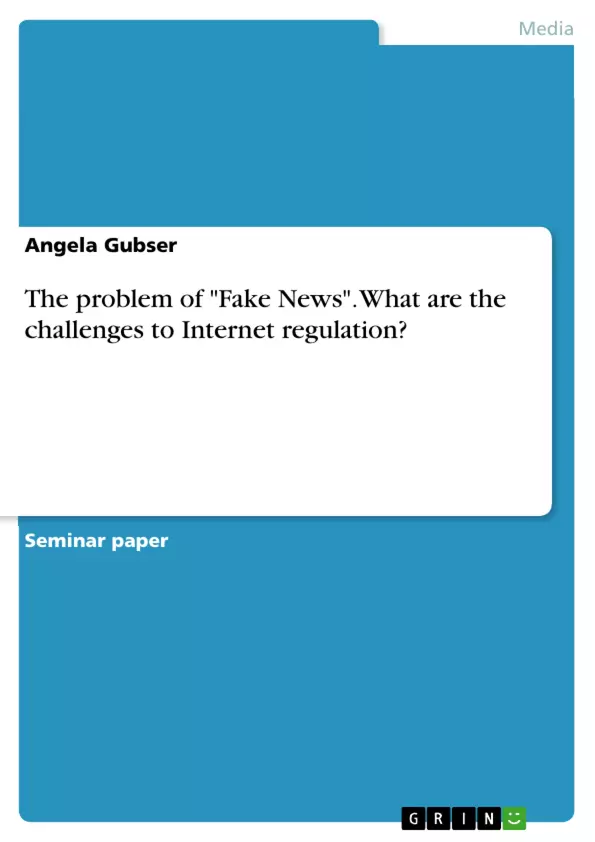The purpose of this paper is to take a closer look at the problem of fake news and to evaluate if regulations of any kind could have a positive impact. The two following questions will be front and center: What are the primary challenges to Internet regulation in general and fake news in particular? What are possible paths to resolutions to those challenges? In order to analyze those questions, this paper will first address the consumption of news online and the role social media in particular. In a second step, the subject of "fake news" will be introduced. It will also take a look at the theoretical background and problems when it comes to regulations of online content. Then, those problems and possible solutions will be discussed in connection to the chosen example of fake news. Lastly, the results will be summarized and a conclusion will be drawn.
Overall, it should be noted that the challenges described in this paper relate exclusively to political news and cannot be generalized across all subcategories of news. The discussion will focus primarily on the United States. This can mainly be justified due to their political and economic dominance on the world stage. Furthermore, major Internet companies, for instance Facebook, Twitter and Google, are all based in the United States. Finally, the recent presidential election has provoked an international debate and offers a great basis for further analysis.
Events during the past decade have demonstrated that social media, such as Facebook, Twitter, and YouTube, are changing the way individuals consume and share news. News stories can be distributed across borders and discussed by people around the world within minutes. One example includes news of the protests in the Middle East that spread through the social media networks Twitter and Facebook. Situations like this demonstrated how posted stories, photos and videos could immediately attract world-wide attention and how social media platforms can support news production and diffusion. Indeed, the spread of news on social media has become a phenomenon of increasing social, economic and political magnitude. Recently though, the proliferation of fake news on social media has been subject of an intensive international discussion.
Table of Contents
- Introduction
- News Consumption on the Internet
- The Problem of Fake News
- Challenges of Internet Regulation
- Discussion
- Conclusion
Objectives and Key Themes
This paper aims to examine the problem of fake news and evaluate the potential effectiveness of regulations in addressing it. It focuses on the challenges posed by internet regulation in general and fake news specifically, exploring potential solutions.
- The impact of social media on news consumption
- The rise and spread of fake news online
- The challenges of regulating internet content
- The potential for regulation to mitigate the problem of fake news
- The implications of fake news for political discourse and public opinion
Chapter Summaries
- Introduction: This chapter sets the stage for the paper, highlighting the increasing importance of social media for news consumption and the growing concern about fake news. It introduces the two central questions that the paper aims to address.
- News Consumption on the Internet: This chapter discusses the shift towards online news consumption in the U.S. and the role of social media platforms like Facebook, YouTube, and Twitter in this trend. It highlights the prominence of Facebook as a source of news for a significant portion of the U.S. population.
- The Problem of Fake News: This chapter introduces the concept of fake news and its impact on the recent U.S. presidential election. It clarifies the definition of fake news in the context of the paper and explores the factors contributing to its spread, including the motivation of creators, the role of social media platforms, and the influence of political personalities.
Keywords
Fake news, social media, internet regulation, news consumption, online content, political discourse, public opinion, misinformation, deception, U.S. election, Facebook, Google, Twitter.
Frequently Asked Questions
What are the primary challenges to regulating fake news?
Challenges include the speed of information spread on social media, jurisdictional issues across borders, and the balance between regulation and free speech.
How does social media change news consumption?
Social media platforms like Facebook and Twitter allow news to be shared and discussed globally within minutes, often bypassing traditional editorial filters.
Why is the discussion focused on the United States?
The US is home to major internet companies like Google and Facebook, and the 2016 election provoked an international debate on the impact of misinformation.
What motivates the creation of fake news?
Creators are often motivated by financial gain (ad revenue) or political influence, using sensationalist stories to attract attention and clicks.
Can Internet regulation solve the problem of fake news?
The paper evaluates whether regulations could have a positive impact, while acknowledging the technical and political difficulties of controlling online content.
- Quote paper
- Angela Gubser (Author), 2016, The problem of "Fake News". What are the challenges to Internet regulation?, Munich, GRIN Verlag, https://www.grin.com/document/468885



